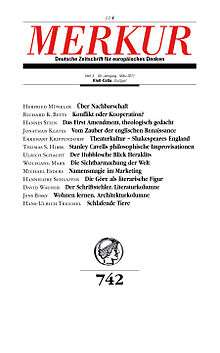Merkur (magazine)
Merkur, subtitled Deutsche Zeitschrift für europäisches Denken, is Germany's leading intellectual review, published monthly in Stuttgart by Klett Cotta.[1]
 | |
| Frequency | Monthly |
|---|---|
| Circulation | 4,800 |
| Publisher | Klett Cotta |
| Year founded | 1947 |
| Country | Germany |
| Based in | Stuttgart |
| Language | German |
| Website | www.merkur-zeitschrift.de |
| ISSN | 0026-0096 |
History and profile
Merkur has been published since 1947 and had an edition of approximately 4,800 copies as of July 2011.[1] The magazine was formerly headquartered in Munich.[2]
In the course of its history, many influential scholars and public intellectuals have written for Merkur. Among them were philosophers such as Hannah Arendt, Theodor W. Adorno, Ernst Bloch, Martin Heidegger, Hans-Georg Gadamer, Jürgen Habermas, Axel Honneth, and Carl Schmitt or sociologists such as Arnold Gehlen, Niklas Luhmann, Hans Joas, and Dirk Baecker, but also writers such as Ingeborg Bachmann, Ilse Aichinger, Alfred Andersch, Hans Magnus Enzensberger, and Kathrin Röggla. Merkur has been able to gather voices from both the left and the right, which is unusual in the divisive German intellectual landscape.
In January 2016, the 800th issue was published.[3]
See also
References
- Economy Point. "Merkur (magazine)". Economy-point.org. Archived from the original on 26 May 2012. Retrieved 3 December 2011.
- Western Europe 2003. Psychology Press. 30 November 2002. p. 294. ISBN 978-1-85743-152-0. Retrieved 28 February 2016.
- Klett-Cotta. "MERKUR 2016". Retrieved 29 December 2015.
External links
- Official website
